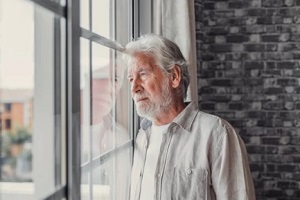 Growing older comes with challenges that often creep in quietly: gradual loss of mobility, a reduction in vision, and more. However, few people understand the impact of losing their social ties as they age. Unfortunately, loss of social connections is extremely common, and elderly loneliness is a significant problem for older individuals.
Growing older comes with challenges that often creep in quietly: gradual loss of mobility, a reduction in vision, and more. However, few people understand the impact of losing their social ties as they age. Unfortunately, loss of social connections is extremely common, and elderly loneliness is a significant problem for older individuals.
Loneliness poses risks not just to mental health alone but also to physical well-being. However, there are strategies available to broaden an older person’s horizons and ensure they remain in contact with people who can energize and invigorate them—even if they no longer have the mobility, hearing, and other abilities they used to have.
Following is an overview of elderly loneliness, including what causes it, why loneliness is a big problem, and ways to improve the situation.
Statistics on Elderly Loneliness
Loneliness exists on a spectrum ranging from occasionally missing friends to being completely socially isolated, with no contact with other humans. Within this spectrum, elders often sit toward the more severe end; the
CDC indicates that as many as 25% of older adults qualify as completely socially isolated. An additional 33% self-report as feeling lonely, though they still have some limited contact with others.
As a person grows older, their likelihood of suffering from severe and persistent loneliness increases. There are multiple reasons for this, from decreasing mobility to a circle of friends that is gradually thinning as individuals pass away or move to assistive care.
Women are generally more likely to report themselves as lonely, though researchers are not clear if this is because women are more affiliative and susceptible to loneliness or because men are unwilling to report that they are unhappy.
Why Loneliness Matters
No matter what degree of loneliness your loved one or family member is facing in their older years, it is critical that you take steps to mitigate the impact.
Loneliness can dramatically reduce quality of life and even longevity, with some studies connecting loneliness with nearly a two-fold increase in mortality for elders. When people are lonely, they are much more likely to die prematurely from any cause.
Why this occurs is still somewhat a mystery, but it bears out across numerous studies. One hypothesis is that a person’s mental health is negatively impacted by loneliness, resulting in them taking less adequate care of themselves.
Others make a more direct connection between the underlying stress and hormone responses of loneliness in the body and increased inflammation, including strain on vital organs such as the heart and circulatory system.
Human beings are tribal creatures. We have evolved to thrive and depend upon the presence and interaction of others. When we are deprived of this, we suffer mentally, physically and emotionally.
The Main Causes of Elderly Loneliness
Being sure to address loneliness can be a powerful way to improve the quality of life of someone you love and can also help them live longer and better enjoy the time they have left. In order to treat loneliness, you must understand the factors that can contribute to it. Some of the most frequent are:
- Mobility – When your elderly loved one can no longer travel on their own, options for leaving the house to meet with friends become limited. Consider arranging activities for your loved one, and setting aside time each week or month to help them meet with others by offering transportation and assistance or making transportation arrangements. any local resources can provide this service. The internet can be a useful tool to connect them through message boards, hobby groups, streaming services, zoom seminars, online classes, and more.
- Cognitive decline – Another reason that older individuals become lonely is that they may slowly lose their memory and ability to converse and engage with others. To remedy this, consider recruiting the help of an in-home caregiver, who can visit regularly and ensure they do not spend significant amounts of time alone. This can help prevent fatigue on your part as well.
- Loss of purpose – As people age, they often begin to feel like they have nothing left to contribute, or that they are just waiting until they pass away. One powerful way to curb the loneliness that stems from loss of inspiring connections is to involve them in groups and hobbies. Anything from in-person knitting clubs to online forums where they can share their knowledge can help them feel connected to others. Even collaborating with a pen pal can give them a renewed sense of purpose and connection.
Every senior is different, but if you focus on (1) activities and involvement, (2) solving mobility, (3) supporting or accommodating cognitive decline, and (4) attacking loss of purpose that will go a long way to improving their enjoyment and quality of life, and directly reduce loneliness.
Learn About Resources from Local Advocates
Growing older does not have to come with a looming sense of loneliness. Many local resources are available at the community level to ensure your loved one can remain engaged with friends, hobbies, and passions no matter their age or physical ability.
The team at Shepherd’s Center of Northern Virginia strives to make these resources available to as many people as possible. Contact SCNOVA to learn more about the opportunities that exist in your local community.
